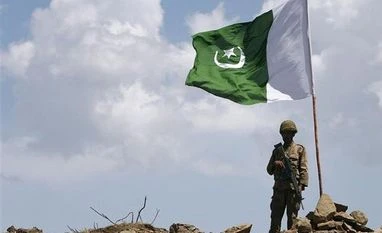Iran's Chief of Army Staff Major General Mohammad Baqeri has warned Pakistan that Tehran would not hesitate to strike terrorists' safe havens if Pakistan fails to control their movement on their border or fails to shut down their bases.
"Unfortunately, Iran's eastern border regions with Pakistan have become a safe haven for training and equipping terrorists recruited by Saudi Arabia and supported by the United States. We will not tolerate this situation in the joint borders and expect the Pakistani officials to show responsibility, control their borders, arrest terrorists and shut down outlaws' bases,' IRNA news agency quoted Major General Baqeri as saying.
"If continued, we will hit the terrorists' safe havens anywhere they are," he added.
Asserting that enemies are trying to damage the country's security using all available tools, Major General Baqeri urged the Iranian Armed Forces to promote their scientific skills and equip themselves with sophisticated technologies in order to get prepared for countering various types of threats.
He also praised the sacrifices made by the Iranian Armed Forces to preserve the country's security.
Lashing out at Islamabad for failing to prevent terror attacks against Iran from its soil, Chairman of the Iranian Parliament's National Security and Foreign Policy Commission Alaeddin Boroujerdi last month had said that the neighbouring country has become a "safe haven" for terrorist cells.
Boroujerdi, who was on a visit to the southeastern province of Sistan and Balouchestan, expressed his condolences over the death of 10 Iranian border guards in a recent terrorist attack that was launched from inside Pakistan.
Also Read
"Given that terror cells' safe haven is located inside Pakistan and they (terrorists) cross the Islamic Republic of Iran's borders from there, undoubtedly, the Pakistani government is responsible for the bitter incident and other similar cases," Tasnim News Agency quoted Boroujerdi, as saying.
Asserting that Pakistan practically lacked the ability to control its borders, the parliamentarian said that it was the right of Iranian forces to take the necessary actions and respond to such attacks.
Pakistan's relations with Iran have nosedived after the recent killing of ten Iranian border guards at Mirjaveh on the Sistan-Baluchistan border by the Pakistan-based Sunni terror outfit, Jaish al-Adl or "The Army of Justice".
Tehran's move to summon Pakistan Ambassador to Iran, Asif Durrani and ask Islamabad to act "seriously and decisively" to detain and punish the (Jaish al-Adl) terrorists is in itself a pointer to the deterioration in relation, following the killing of the Iranian Border guards.
In a letter to Pakistan's Prime Minister Nawaz Sharif, Iran's President Hassan Rouhani said that given the warm and friendly ties with Pakistan, he was extremely disheartened to see militants using Pakistani soil to launch their attacks on people in Iran.
His anguish and anger over the killing of border guards was reflected in the statement that Iran "is very disheartened that it is repeatedly transgressed upon from Pakistani soil by armed bandits and terrorist hirelings."
He added, "Iran's soil has never been abused against any of its neighbours, including Pakistan."
Iranian police said the guards were killed by long-range guns and called on Islamabad to assume ultimate responsibility for the crime.
The Sistan-Baluchistan province in south-east Iran has long been plagued by drug smuggling gangs and separatist militants. The population of the province is predominantly Sunni Muslim, while the majority of Iranians are Shias.
The Jaish al-Adl is a Sunni militant group that has carried out several attacks on Iranian security forces with the aim of highlighting what they say is discrimination against Sunni Muslims and the Baluch ethnic group in the province.
In the last four years, this was the third instance of the militant group claiming responsibility for an attack.
It may be recalled that in October 2013, 14 Iranian border guards were killed. A further eight were killed in April 2015.
)